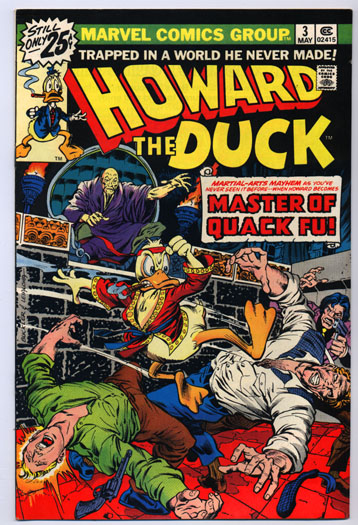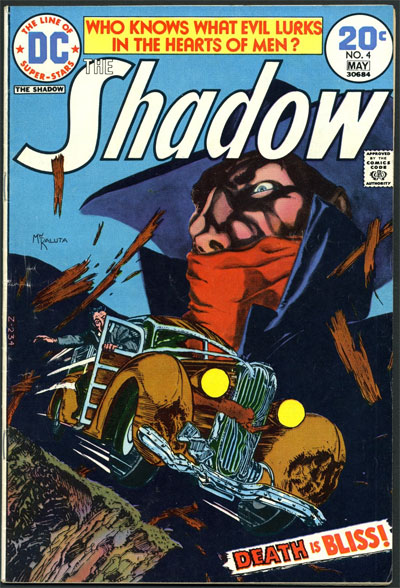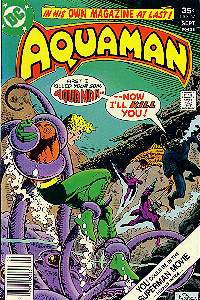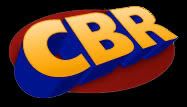Friday, March 20, 2009
Inteview with Herb Trimpe
It looks like there's a Herb Trimpe renaissance taking place. He's had new work published in Hulk specials over at Marvel, while fandom is taking a second look at his legacy (which follows about 15 years of Wizard magazine talking shit about him. Who's laughing now Gareb Shamus?) I met Trimpe last year at a convention and he had one of the longest lines in the building (and accidentally managed to block people from visiting June Brigman's table next to his.)
The interview above is from a 2008 Pop Culture America show.
Thursday, March 19, 2009
The Master of Quack Fu
 I love me some Howard the Duck, but the book always worked best when it avoided explicit superhero parodies.
I love me some Howard the Duck, but the book always worked best when it avoided explicit superhero parodies.The weakest issues in the series were parodies of other Marvel titles. Sure, “Iron Duck” and the “Master of Quak Fu” made for some great cover art, but the stories were tepid (Howard as “Son of Satan” is the exception.)
The third issue is intended as a lampoon of the kung fu craze of the mid 1970s. The problem is that writer Steve Gerber doesn’t really know what he thinks about the fad. Howard, of course, hates it, but Gerber can’t eloquently explain why, and the book frequently contradicts itself.
The story begins with Howard and Beverly leaving a kung fu movie. Howard is clearly disgusted by the violence in the film, calling it “training for the local troops.” He also takes issue with Hollywood exploiting as “ancient tradition” for its own end as he stands on the street shouting at people. All he needs is a box to stand on with the word “soap” written on it.
Anyway, the kung fu craze gets out of control when, at a local diner, Howard and Bev see a character named "Count Macho" (based on Count Dante, who ran numerous ads in comics in the 1970s) kill an overzealous karate fan.
Early in the issue, Howard proclaims that people who enjoy violence "don't have the mental equipment to be sure they exists." So what does he do when Count Macho kidnaps Bev? He takes a crash course in kung fu so that he can fight back. Like all good liberals (and conservatives, for that) Howard's real concern isn't his own ability to process reality ... it's everyone else's. He thinks he lives in a world of idiots, which is probably true. He simply can't recognize that he's an idiot, too.
I'm not really sure what Gerber's message here, was. It begins as a slam against kung fu movies, but the story would have felt at home in a Shaw Brothers picture. Howard abhors violence, but turns to it the first chance he gets. Because the story has no intellectual center to argue from, the issue feels like nothing more than propaghanda.
The issue features guest art by John Buscema. Frank Brunner quit after two issues when Marvel passed on a requested pay raise. It was their loss ... Brunner is a fantastic artist.
Friday, March 13, 2009
Vertigo gets off to an early start
 DC Comic's "Vertigo" imprint didn't launch until 1993, but the seeds for the line had been in place since the early 1970s. DC had experimented with more mature titles (i.e., "not superheroes") a few times, with such books as Swamp Thing, The Shadow, Jonah Hex and their assorted mystery/horror anthologies. For a lot of reasons (such the the national paper shortage, changes in editorial staff, etc.) the company had a hard time keeping any new book in print for more than a dozen issues, so many of their best books were also their most brief.
DC Comic's "Vertigo" imprint didn't launch until 1993, but the seeds for the line had been in place since the early 1970s. DC had experimented with more mature titles (i.e., "not superheroes") a few times, with such books as Swamp Thing, The Shadow, Jonah Hex and their assorted mystery/horror anthologies. For a lot of reasons (such the the national paper shortage, changes in editorial staff, etc.) the company had a hard time keeping any new book in print for more than a dozen issues, so many of their best books were also their most brief.One of the best comics the company published in the 1070s was the Denny O'Neil/Mike Kaluta interpretation of The Shadow (it also featured some occasionally uncredited assistance from Jeff Jones and Bernie Wrightson.) It was a no-nonsense interpretation of the William Gibson pulps, with The Shadow portrayed more like an underworld boogeyman than a costumed adventurer. Kaluta left the book after a few issues, with the remainder completed by the likes of Frank Robbins and the much-underrated E.R. Cruz. The series even featured the first meeting of The Shadow and The Avenger, something that pulp fanboys had been talking about for decades. They'd meet again in the late 1980s, during the controversial — and hilarious — run on The Shadow by Andy Helfler and Kyle Baker (anther prototype series for Vertigo.)
After a dozen issues, though, DC pulled the plug. O'Neil said he was never offered a reason for the book's cancellation and had every reason to believe it had sold well (at least, well enough to continue publication.) The O'Neil/Kaluta stories were collected in The Private Files of The Shadow, a hardback that has been out of print for many years (and will likey remain so, seeing how the comic rights to The Shadow are about as popular as Chris Brown right now.)
Labels:
comics,
DC Comics,
Denny O'Neil,
Michael Kaluta,
The Shadow,
Vertigo
Thursday, March 12, 2009
Tomb of Dracula: THE MOVIE
No, I don't mean Blade: Trinity. In 1981 a Japanese company created a short movie based on Marvel's Tomb of Dracula comic. This was actually available for a time on video in America, but has been out of print for probably 25 years. Where's Anchor Bay when you need them?
And, while I'm at it, why isn't this available on video, too?
Wednesday, March 11, 2009
Godzilla is a Four-Letter Word
 Here's a story that kinda creeps me out.
Here's a story that kinda creeps me out.When I was a kid (maybe five years old) my neighbor had a copy of Godzilla that had the Avengers in it. I was floored seeing the likes of Thor and Iron-Man on the same pages as Godzilla. But my neighbor, who was a few years older than me, wouldn't let me read it.
His reason? It was full of too many "bad words." He'd open the pages at random and point to some word in a balloon and tell me it was a "cuss word" and that I shouldn't say it.
Part of me wants to think that he simply didn't want to share his comic, but if it was a power play he'd have got a kick out of taunting me (which he didn't.) If he really wanted to embarrass me, he would have done the opposite: trick me into thinking a dirty word was, in fact, harmless (which would have provided much more entertainment.)
As it stands, I don't know what his goal was. It still weirds me out. I still haven't got around to reading this issue, though I did meet the artist on the book (Herb Trimpe) last year.
Rachel Rage

 Technically, not a Bronze Age comic — but it should have been. Check out John Aston's Rachel Rage strip, available for free at Olde Town Comix (and soon in a collected trade paperback.) I won't waste time trying to summarize the plot from you ... a quick look at the art to your left should give you fair warning of what you're in for.
Technically, not a Bronze Age comic — but it should have been. Check out John Aston's Rachel Rage strip, available for free at Olde Town Comix (and soon in a collected trade paperback.) I won't waste time trying to summarize the plot from you ... a quick look at the art to your left should give you fair warning of what you're in for.
1974 Interview with Vaughn Bode
A three-part interview with the late Vaughn Bode at the 1974 Tornoto ComicCon. He speaks about creator rights, censorship, Stan Lee, National Lampoon, the birth of Cheech Wizard and more.
Batman #169: "Partners in Plunder"
 Here's a little side trip to the Silver Age, an issue of Batman that has him matching wits with himself.
Here's a little side trip to the Silver Age, an issue of Batman that has him matching wits with himself.This is an interesting little story from an era notoriously light in substance. The line of Batman books had been recently invigorated with a new editorial direction (called "The New Look.") For the first time in many years, Batman and Robin were allowed to fight crime, rather than aliens and robots.
What's interesting is that, during these years, the Dynamic Duo fought plain-clothed gangsters more often than the deformed/costumed criminals they are best known for. During the first year, the Joker, Penguin and the Riddler all made in appearance in either Batman or Detective, but the creative team seemed more interested in finding new villains.
Batman #169 is the first appearance of the Penguin in the "New Look" era, but he's changed little from his early days. He's still obsessed with umbrellas and how they can be used in crime, and has no interest in hurting anyone.
His plan in this issued, titled "Partners in Plunder," is surprisingly clever, though. He begins a wave of chaos in Gotham, flooding streets and stores with wacky umbrellas that cause a lot of confusion — but there doesn't appear to be method to the madness. Batman is sure the Penguin is responsible, but can neither prove it, nor figure out the point to it all.
The reason is simple: the is no point. The Penguin's plan is to create a criminal "Rorshach blot" layered in possible clues and symbols that have no meaning. He's convinced — rightfully so — that Batman will infer what he will from the "clues" and find a way to keep the Penguin from reaching the alleged goal. Little does he know that the Penguin planted listening devices in a few of the umbrellas confiscated by Batman. He's been listening in on the Dynamic Duo's speculations and likes what he hears. He also know how Batman plans to stop him, which gives him the edge.
Even though he successfully pulls off the scam Batman has unwittingly planned for him (the theft of a jeweled meteorite) he fails to get away. During a chase using rocket umbrellas, Robin's lighter weight allows him to overtake the Penguin and throw a lasso around him. It's a victory for the Dynamic Duo, but not one they necessarily earned.
Subscribe to:
Posts (Atom)








